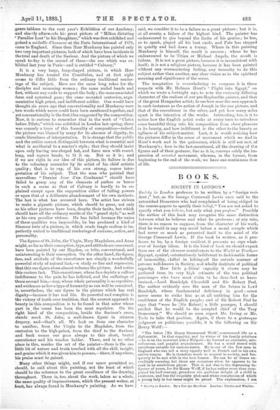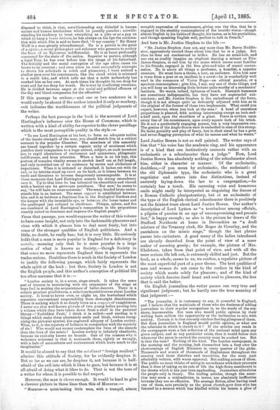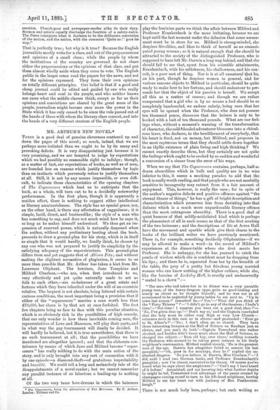BOOKS.
SOCIETY IN LONDON.*
Society in London professes to be written by a "foreign resident ;" but, as Sir George Cornewall Lewis once said to the astonished Dissenters who had complained of being obliged in the census-papers to specify their belief," You are not asked to specify what you believe, but only what you profess." Possibly the author of this book may recognise the same distinction between what he believes and what he professes ; at any rate, there is no reason to suppose, from the character of his work, that he would in any way recoil before a moral scruple which had never so much as presented itself to the mind of Sir George Cornewall Lewis. If the book be written, as it professes to be, by a foreign resident, it presents no sign whatever of foreign idiom. It is the kind of book we should expect from one of the cleverer contributors to the World or Truth,— flippant, cynica,l, ostentatiously indifferent to fashionable forms of immorality, skilful in hitting-off the outside manner of persons well-known in Society, and wholly destitute of political sagacity. How little p >litical sagacity it shows may be gathered from its very high estimate of the two political personages who have most &aim to be described as harebrained,—Lord Randolph Churchill and Sir Robert Peel. The author evidently sees the man of the future in Lord. Randolph, whose fundamental deficiency in good sense never seems to Strike him as at all unfitting him for the confidence of the English people; and of Sir Robert Peel he says that "were he [Sir Robert] a little younger, I should predict that he would be the accepted chief of the Tory Democracy." We should as soon expect Mr. Irving or Mr. Toole to take that position. Again, if there be a grotesque judgment on politicians possible, it is the following on Sir Henry Wolff:— • " The latter [Sir Henry Drummond Wolff] commenced life as a diplomatist. In that capacity, and by virtue of his family relations —he is on the maternal side a Walpole—he formed an extensive, miscellaneous, and panglot acquaintance. He has a mind stored with anecdotes suitable for various tastes. He is one of the few men in England who can tell a story equally well in French and in his.own native tongue. He is therefore much in request in society, and frequently to be met with in the best houses.. Ho can be at times exceedingly amusing, but there aro occasions when he appears to be sunk in an atrabilious gloom.. This is not due to the depressing influence of years, for Sir Henry Wolff, if ho has rather more than corapleted his half-century, preserves the guileless delight of a child in existence, and has the exquisite pink-and-white complexion of which a young lady in her teens might be proud. The explanation, I am disposed to think, is that, notwithstanding any disbelief in human nature and human institutions which be jauntily parades ; notwithstanding his tendency to treat everything as a joke or as a peg on which to hang a bonne histoire, he has always on his lips the exclamation with which Pitt is said to have died, 0 my country I' Sir Henry Wolff is a man greatly misunderstood. He is a patriot in the guise of a cynic ; a moral philosopher and reformer who presents to society the front of en Epicurean indifferentist. He is at heart profoundly concerned for the state of the nation. Superior to parties, although a loyal Tory, be has ever before him the image of his fatherland. The frivolity and the social corruption of the age often cause his brows to be overcast; and even when he most successfully attempts to drown his solicitude in mirth and pleasantry, I have noticed a shadow pass over his countenance, like the cloud which is mirrored in a sunlit lake, and which tells me that a noble melancholy has marked him as her own. At such times his thoughts lie too deep for tears and far too deep for words. He is rent by conflicting emotions. He is divided between anger at the social and political offences of the day and bland compassion for the offenders."
If this passage be serions,—and one or two sentences in it would surely be absent if the author intended it only as mockery, —it indicates the worthlessness of the political judgments of the writer.
Perhaps the best passage in the book is the account of Lord Hartington's influence over the House of Commons, which is written with a kind of ability far superior to the clever persiflage which is the most perceptible quality in the style
" To see Lord Hartington at his best, to form an adequate notion of the innate strength of the man, you should watch him at a critical moment in the popular Chamber. The members of this assembly are bound together by a certain organic unity of sentiment which justifies their comparison to a huge animal, subject, as such monsters are, to rapid alterations of excitement and quiescence, phlegmatic indifference, and keen attention. When a bore is on his legs, this portent of complex vitality seems to stretch itself out at full length, and only to remind one of its existence by snorts and sibilations of impatience. When it is irritated or disturbed, it lashes out with its tail, or its bristles stand up erect on its back, or it hisses between its teeth and threatens to become dangerously unmanageable. It is at these moments that Lord Hartington asserts his strong ascendency over it. Up to that time he has tolerated its absurdities and viewed with a lenient eye its grotesque petulance. 'But now,' he seems to say, he will have no more nonsense.' The many.headed brute understands him in an instant. The same rapport is established between him and it as between a fractious lion in the Zoological Gardens and the keeper with the irresistible eye, or between the horse tamer and the quadruped just reduced to obedience. Phlegm, spleen, and fire are combined in Lord Hartington's composition in the proportions exactly suited to dominate and impress the English people."
From that passage, you would suppose the writer of this volume to have some insight, not only into the fashionable pleasures and vices with which it pleases him to deal most freely, but into some of the stronger qualities of English politicians. And a little, no doubt, he really has ; but it is very little. He seriously holds that a man is more popular in England for a deficiency in morale,—meaning only that he is more popular in a large
section of what is known as Society,—though Society in that sense no more repres'ents England than it represents the trades-unions. Doubtless there is much in the Society of London to justify the following passage, which fairly represents the whole spirit of the book ; but then, Society in London is not the English people, and this author's conception of political life too often assumes that it is :
"London society is, in a sense, stage-struck. It takes the same sort of interest in associating with the ornaments of the stage as boys feel in making the acquaintance of ballet-dancers. There is a certain prurient prudishness, a salacious inquisitiveness about London society. It loves to hover over, or alight on, the borderland which separates conventional respectability from downright dissoluteness. There is nothing which it so dearly loves as a soupcon of naughtiness. I never see that well-known picture of two young ladies peering into a volume which they have taken down from a shelf in the paternal library—' Forbidden Fruit,' 1 think it is called—and reading in it things which make them alternately smile and blush, without recognising the pictorial symbol, the engraved allegory of London society. What, to it, is the mystery of holiness in comparison with the mystery of sin ? Who would not sooner contemplate the lives of the sinners than the lives of the saints ? London society is infinitely charitable, because its curiosity knows no bounds. One of the reasons why it welcomes actresses is that it surrounds them, rightly or wrongly, with a halo of antecedents and environment which leave much to the imagination."
It would be absurd to say that the soi-clisant" foreign resident" admires this attitude of Society, for he evidently despises it. But so far as we can see, he despises it, not because it is halfafraid of the evil into which it likes to gaze, but because it is at all afraid of doing what it likes to do. That is not the tone of a writer for whom it is possible to feel respect.
However, the man is clever enough. It would be hard to give a cleverer picture in three lines than this of Musurns : " Musurus—a quiet-looking little man, with a tranquil, almost
seraphic expression of countenance, giving one the idea that he is engaged in the stealthy contemplation of the beatific vision—though almost English in his habits of thought, his tastes, as in his partialities, and though speaking English well, prefers to talk in French."
And here is Mr. Justice Stephen to the life :—
" Mr. Justice Stephen does not, any more than Mr. Baron Huddleston, aggressively remind those about him that he is a judge. But then he does not condescend to trifles. He has no small-talk, and one can as readily imagine an elephant dancing a minuet as Fitz. James Stephen, to call him by the name which seems most familiarto his friends, engaged in the free give-and-take of casual conversation. He is above all things a professor, a homilist, a superior creature. He must have a thesis, a text, an audience. Give him now a verse from a poet or an incident in a novel—he is wonderfully well read in the romances of Victor Hugo—an ethical paradox, or a specious commonplace ; give him, I say, any one of these things, and you will hear an interesting little lecture quite worthy of a mechanics' institute. He wants, indeed, lightness of touch. Nasmyth hammers are sometimes indispensable, but they have not superseded nutcrackers; and Mr. Justice Stephen is the embodiment of the force, though it is not always quite as delicately adjusted with him as in the original of the former of these two implements. What could you expect, however, when you look at the man ? A head of enormous proportions.is planted, with nothing intervening except an inch.anda-half neck, upon the shoulders of a giant. Force is written upon every line of his countenance, upon every square inch of his trunk. He is not a particularly engaging person, but a very impressive one.. The genius of the Anglo-Saxon race it embodied in men of this stamp. He lacks geniality and play of fancy, but in their stead he has a grim and neventiagging perception of what he means and what he wants."
Lord Justice Bowen is not so well painted. The writer says of him that " his voice has the academic ring, and his appearance is of a kind that one instinctively connects rather with an ecclesiastic or a schoolmaster than a judge." Now, Lord Justice Bowen has absolutely nothing of the schoolmaster about him, either in character or manner. Of the ecclesiastic, doubtless,—if you mean by ecclesiastic, the ecclesiasti3 of the old diplomatic type, the ecclesiastic who is a great negotiator and enters into fine distinctions, instead of austerely laying-down the law to a congregation,—he certainly has a touch. His caressing voice and humorous. smile might easily be interpreted as disguising the finesse of a Roman Catholic plenipotentiary, but of an ecclesiastic of the type of the English clerical schoolmaster there is positively not the faintest trace about Lord Justice Bowen. Our author's description of Lord Lytton as " a troubadour among officials, a pilgrim of passion in an age of uncompromising and prosaic fact," is happy enough ; as also is the picture he draws of Sir Stafford Northcote at home in Devonshire as "a droll mixture of the Treasury clerk, Sir Roger de Coverley, and the pantaloon on the mimic stage," though the last phrase. passes into caricature. A good many of the ladies introduced are cleverly described from the point of view of a mere maker of amusing gossip ; for example, the picture of Mrs. Gladstone, taken from that point of view, and with all the more serious life left out, is extremely skilful and just. But the book, as a whole, seems to us, we confess, a repulsive picture of the most superficial part of a poor theme. The best qualities of men and women do not come to the surface in the kind of society which meets solely for pleasure ; and of the kind of society which devotes itself heart and soul to pleasure, the less that is said the better.
On English journalism the writer passes one very true and significant judgment; but he hardly sees the true meaning of that judgment :—
" The journalist, it is customary to say, is powerful in England, and I believe that the multitude of those who are desirous of adding journalism to their regular occupations is, as the sands of the seashore, innumerable. But men who mould public opinion, by their writing have seldom the opportunity or-the inclination to mix with society. Certain it is that one only catches fleeting glimpses of them. But does journalism in England mould public opinion, or what are the relations in which it stands to it ? If the articles one reads in the newspapers were a fair reflection of the national mind upon any given subject, and at any particular crisis, then it would follow that whenever the press is excited the country must be excited too. But is that the case? Nothing of the kind. The London newspapers, in the morning and the evening, lash themselves into a fury over the shortcomings of English Ministers in every quarter of the globe. Thousands and scores of thousands of Englishmen throughout the country read those diatribes and invectives, for the most part admirably written, with warm approval. But nothing comes of them. The public no more thinks of acting in accordance with their precepts than it does of taking as its rule of life the high-flown sentiments in the drama which it has just been applauding. Journalism stimulates the people only in theory. The leading articles, though the assertion may seem a contradiction in terms,' are absolutely ineffective because they are so effective. The average Briton, after having read one of them, acts precisely as the pious church-goer does who has listened to a sermon which has kindled within his bosom a glow of
emotion. Church-goer and newspaper reader alike do their duty. Sermon and article equally discharge the function of a safety-valve. The Press interprets what it declares to be the deliberate conviction
of the nation, and the nation, with the comment Quite so ! ' goes its way.,,
That is perfectly true ; but why is it true? Because the English journalists mostly write for a class, and out of the prepossessions and opinions of a small class ; while the people by whom the institutions of the country are governed do not share either the prepossessions or the opinions of that class, and put them almost wholly aside when they come to vote. The English public in the larger sense read the papers for the news, and not for the opinions expressed. They form their own opinions on totally different principles. Our belief is that if a good and cheap journal could be edited and guided by one who really belongs heart and sonl to the people, and who neither knows nor cares what the middle classes thihk, except so far as their opinions and convictions are shared by the great rim of the people, journalism might become once more the power in the State which it has only ceased to be since the rule passed out of the hands of those with whom the literary class consort, and into the hands of a very different stratum of the English people.




































 Previous page
Previous page